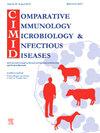Cross sectional survey on the prevalence and associated risk factors of toxoplasma infection in pregnant women in Biskra (Southeastern Algeria)
IF 2
3区 农林科学
Q4 IMMUNOLOGY
Comparative Immunology Microbiology and Infectious Diseases
Pub Date : 2025-07-12
DOI:10.1016/j.cimid.2025.102384
引用次数: 0
Abstract
Toxoplasmosis, caused by Toxoplasma gondii, is a zoonotic disease with significant global public health implications. In Algeria, data on its epidemiology are scarce. This study aimed to assess for the first time the seroprevalence of toxoplasmosis and identify associated risk factors among pregnant women in Biskra governorate in southeastern of Algeria. A cross-sectional survey (October 2022–May 2023) involved 453 women. Data on socio-demographics characteristics, gynecological history, and lifestyle habits were collected via structured questionnaires. Plasma samples were analysed for IgG and IgM antibodies using ELISA techniques. Statistical analyses, including univariate and multivariate logistic regression, were performed to identify significant risk factors associated with seropositivity. The overall seroprevalence of toxoplasmosis was 30.02 %. Univariate analysis identified several significant associated risk factors, including a history of spontaneous abortion (OR = 3.897), having single spontaneous abortions (OR = 4.96), consumption of unpasteurized milk (OR = 1.789), and owning pets (OR = 1.593). Living in urban areas appeared to be a protective factor (OR = 0.60). Multivariate analysis further highlighted feeding raw meat to animals (AOR = 8.395) and having given birth to a malformed child (AOR = 6.718) as major risk factors. Additionally, fast food consumption (AOR = 2.07) and cats ownership (AOR = 3.724) were also significantly associated with T. gondii seropositivity. The findings underscore the importance of implementig robust screening, prevention, and treatment strategies for toxoplasmosis, particularly among pregnant women. This study offers valuable epidemiological insights into toxoplasmosis in Algeria, addressing a critical knowledge gap.
阿尔及利亚东南部比斯克拉孕妇弓形虫感染流行及相关危险因素的横断面调查
弓形虫病是由刚地弓形虫引起的人畜共患疾病,具有重大的全球公共卫生影响。在阿尔及利亚,关于其流行病学的数据很少。本研究旨在首次评估阿尔及利亚东南部比斯克拉省孕妇中弓形虫病的血清患病率,并确定相关危险因素。一项横断面调查(2022年10月至2023年5月)涉及453名女性。通过结构化问卷收集社会人口特征、妇科病史和生活习惯数据。采用ELISA技术检测血浆中IgG和IgM抗体。统计分析包括单变量和多变量逻辑回归,以确定与血清阳性相关的重要危险因素。弓形虫病血清总阳性率为30.02 %。单因素分析确定了几个重要的相关危险因素,包括自然流产史(OR = 3.897)、单次自然流产(OR = 4.96)、食用未经巴氏消毒的牛奶(OR = 1.789)和养宠物(OR = 1.593)。居住在城市地区似乎是一个保护因素(OR = 0.60)。多因素分析进一步显示,饲养动物生肉(AOR = 8.395)和生下畸形儿童(AOR = 6.718)是主要的危险因素。此外,快餐消费(AOR = 2.07)和养猫(AOR = 3.724)也与弓形虫血清阳性显著相关。研究结果强调了实施强有力的弓形虫病筛查、预防和治疗策略的重要性,特别是在孕妇中。这项研究为阿尔及利亚弓形虫病提供了有价值的流行病学见解,解决了一个关键的知识缺口。
本文章由计算机程序翻译,如有差异,请以英文原文为准。
求助全文
约1分钟内获得全文
求助全文
来源期刊
CiteScore
4.60
自引率
0.00%
发文量
102
审稿时长
40 days
期刊介绍:
Comparative Immunology, Microbiology & Infectious Diseases aims to respond to the concept of "One Medicine" and to provide a venue for scientific exchange. Based on the concept of "Comparative Medicine" interdisciplinary cooperation between specialists in human and animal medicine is of mutual interest and benefit. Therefore, there is need to combine the respective interest of physicians, veterinarians and other health professionals for comparative studies relevant to either human or animal medicine .
The journal is open to subjects of common interest related to the immunology, immunopathology, microbiology, parasitology and epidemiology of human and animal infectious diseases, especially zoonotic infections, and animal models of human infectious diseases. The role of environmental factors in disease emergence is emphasized. CIMID is mainly focusing on applied veterinary and human medicine rather than on fundamental experimental research.

 求助内容:
求助内容: 应助结果提醒方式:
应助结果提醒方式:


